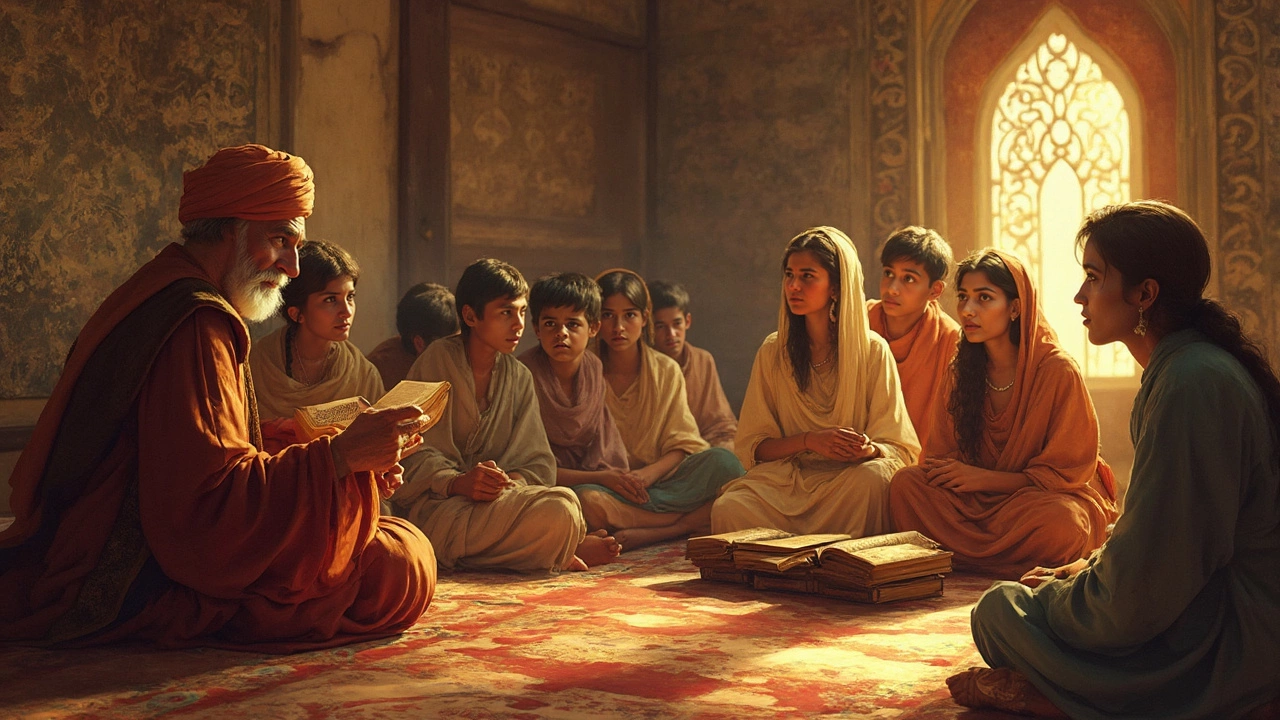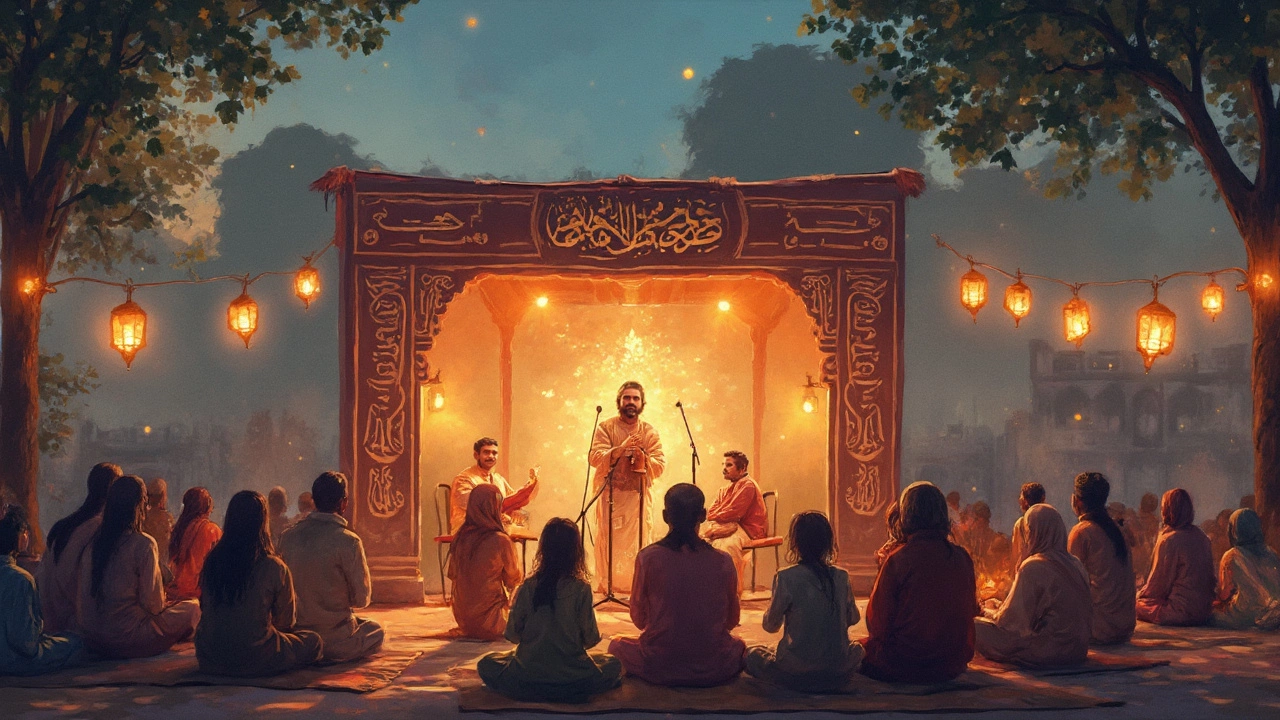Is Ghazal Allowed in Islam? What You Should Know

Not every poem tugs at your heart like a ghazal. But if you’re practicing Islam or just wondering where it stands with religion, the big question pops up fast—is ghazal okay in Islam?
People hear ghazal and think of classic Indian songs, longing, lost love, and that old-school poetic beauty. But let’s get real: Islam does have rules about what you listen to or perform. Some folks say poetry is off-limits, while others open the door, saying it’s all about the words and the impact on your beliefs and morals.
It’s a gray area, not black and white. It really depends on the topics, the message, and even how the poem is performed—kind of like how not every book is the same, even if it’s a ‘book’ on the shelf. Keep reading and you’ll see how to make sense of it, without second-guessing every favorite line.
- What Is a Ghazal?
- Islamic Views on Music and Poetry
- Ghazals That Follow Religious Guidelines
- Tips for Enjoying Ghazals Respectfully
What Is a Ghazal?
If you hang around poetry fans in India or Pakistan, there’s no way you haven’t heard of a ghazal. This is a special type of short poem—usually about love, heartbreak, or even deeper stuff like separation and longing. But what makes a ghazal different from any regular poem?
First, each ghazal is made up of a series of “couplets”—tiny two-line poems, called “sher” in Urdu. Strange thing is, every couplet stands alone, but together they tell a bigger story or vibe. You’ll also spot a repeating phrase at the end of the second line in each couplet. There’s a rhythm here that’s hard to copy in other types of poetry.
- Ghazals usually have at least five couplets, but you’ll often see more.
- Each couplet follows the same meter, giving the whole poem a musical flow.
- The poet often signs their name in the final couplet as a sort of signature, which is a unique touch in ghazal writing.
The ghazal has roots going way back, all the way to seventh-century Arabic poetry. It got a serious boost in Persia, and then centuries later, poets in India made it a core part of Urdu literature. Today, big names like Mirza Ghalib and Faiz Ahmed Faiz are legends because of their ghazals. Even Bollywood uses ghazals in songs, making them pretty popular and accessible far beyond poetry circles.
Here’s a quick look at how the structure compares to regular poems:
| Element | Ghazal | Regular Poem |
|---|---|---|
| Lines per Verse | 2 (Couplet) | Varies |
| Refrain | Yes, repeated in each couplet | Rare |
| Rhythm/Meter | Consistent | Flexible |
The main takeaway? A ghazal isn’t just another poem. It’s a specific art form with set rules—one that’s short, sharp, and usually packs an emotional punch. That’s why it’s stuck around so long in Indian and Islamic cultures where poetry still matters.
Islamic Views on Music and Poetry
The view on ghazal in Islam mostly comes from what Islamic scholars have said about music and poetry across the centuries. If you look at history, you’ll see poetry was common in Arab culture long before and after the start of Islam. Even some Companions of the Prophet were known for their verses. But here’s the thing: not every poem or song is treated the same way.
Officially, the Quran doesn’t ban poetry or music directly. But it warns against things that take you away from faith, honesty, or good morals. Hadiths (sayings of the Prophet Muhammad) touch on music, sometimes with strict warnings, other times showing poetry being recited in his presence, especially if it focused on good messages or didn’t promote anything inappropriate.
- If a ghazal or any poem encourages bad behavior, disrespect, or goes against Islamic values, most scholars frown on it.
- If it’s clean, wholesome, or even spiritual, people tend to accept it. A famous example? Sufi poets like Rumi—loved by many Muslims even today.
- Across regions, opinions shift. In India and Pakistan, for example, religious leaders often say the big thing is the content: is it just expressing deep feelings, or does it cross a line?
A quick stat: A 2019 survey in northern India found that about 70% of Muslim households regularly enjoy ghazal sessions, but almost all make sure songs avoid offensive lyrics. This shows most believers don’t see the art form itself as a problem—as long as it’s respectful.
Bottom line: there isn’t one rule for everyone. It’s up to your personal beliefs and which scholar or school of thought you trust. When in doubt, focus on the message in the poetry, not just the pretty words or catchy tune.

Ghazals That Follow Religious Guidelines
Not all ghazal poems raise religious eyebrows. In fact, plenty fit right in with Islamic teachings, especially if the words and the message line up with what’s considered respectful and clean in the religion. Some classic ghazal writers kept things devotional or philosophical instead of wandering into romantic or suggestive territory, and that’s still a common choice today among poets who want to stay mindful of Islam.
For example, ghazals focused on themes like divine love, gratitude, or self-improvement usually get a nod from scholars. This isn’t just some random idea—it’s echoed in the fact that Sufi poets, like the famous Hazrat Amir Khusro, wrote ghazals aimed at praising God or exploring spiritual longing. These poems avoid controversial subjects like explicit romance or slander, which makes them much more widely accepted. There’s even a tradition where ghazals double as prayers or as reminders to stick to good character.
If you want to write or listen to a ghazal that doesn’t cross any religious lines, here’s what to watch for:
- Keep the language and ideas respectful—avoid insults, mockery, or anything that could be seen as un-Islamic.
- Stick to clean topics: faith, kindness, patience, or admiration for good qualities are always safe bets.
- Skip over any praise of bad habits or anything that would encourage ignoring religious duties.
- When in doubt, check with a religious teacher or expert in your community—many are happy to give feedback.
It’s not just about the words, either. Some scholars say that the way a ghazal is performed matters too. For instance, if it’s recited in a respectful setting and doesn’t mix with activities that clash with Islam (like alcohol or gambling), it’s a lot less likely to be questioned.
Here’s a quick snapshot of topics usually considered okay and not okay in ghazals from an Islamic perspective:
| Allowed Topics | Questionable or Not Allowed Topics |
|---|---|
| Divine love, faith, spirituality, gratitude | Explicit romance, slander, promoting vice |
| Patience, kindness, inner struggle | Praise of alcohol, gambling, disrespectful humor |
Tips for Enjoying Ghazals Respectfully
Ghazals are everywhere in india—from old Bollywood hits to late-night radio shows. But if you want to enjoy ghazal as a Muslim, or just out of respect for the faith, there are some clear things you can do to stay on the safe side and not cross any religious lines.
- Look at the lyrics. Instead of just vibing to the melody, check the message. Ghazals that talk about pure emotions, the beauty of nature, or even spiritual longing are more acceptable. Skip anything that promotes drinking, immorality, or hopelessness—those are usually not seen as cool from an islam perspective.
- Don’t get lost in the atmosphere. Sometimes ghazals are performed with flashy settings—loud music, mixed gatherings, and so on. If you want to keep your experience respectful, listen at home or in simple gatherings, especially with family or friends who appreciate poetry for its art.
- Pick your artists wisely. Some singers and poets are known for keeping things clean and even include religious themes or Sufi messages. Someone like Mehdi Hassan or Abida Parveen? Pretty safe choices. Steer clear of acts that lean towards wild parties or explicit content.
- Watch your time and mood. If a ghazal starts making you sad or moody for no reason, or distracts you from prayers or day-to-day duties, it’s probably better to hit pause. Islam encourages anything that brings peace, not needless worry or depression.
- Get the facts. If you’re not sure about the lyrics or content, there are translations and even online forums where people break down the meaning. Don’t guess—double check if you feel any doubts.
To give you a quick sense, here’s a snapshot of common ghazal themes and how they line up with Islamic guidelines:
| Theme | Usually Acceptable? |
|---|---|
| Love for God/Sufism | Yes |
| Nature, nostalgia | Yes |
| Hopeless romance | Maybe/No |
| Alcohol or partying | No |
| Friendship, advice | Yes |
Everyone has their comfort zone, and the lines can blur quickly with poetry. If in doubt, ask someone who knows religious matters, or at least stick to positive, uplifting themes that most people—Muslim or not—would be fine with.